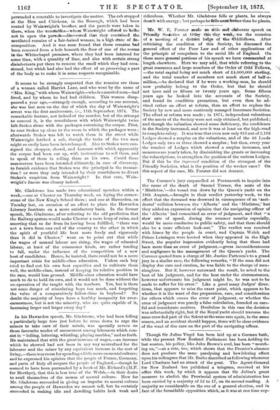Ilfr. W. E. Forster made an eible and elaborate speech
on Friendly Societies at Otley this -day week, on the occasion of a meeting of a district lodge of -the +Oddfellows. After criticising the condition of this Society, he discussed the general effect of the Poor Law and of other applications of the principle of compulson to the social life of England. On these more generabportions of his speech we have commented at length elsewhere. -Ifere-we -may-add, that-while -referring to the great resources and large numbers of the Order of Odd "Fellows, —the total capital being not much short of /4,000,000 sterling, and the total number of members not much short of half-a- million,—he declared that if he were a working-man, he should now probably belong to the Order, but that he should not have said so fifteen or twenty years ago. Some fifteen years ago he looked into the accounts of the Society, and found its condition precarious, but even then he ad- vised rather an effort at reform, than an effort to replace the Society by new and more cautiously managed Insurance Societies. The effort at reform was made ; in 1871, independent valuations of the assets of the Society were not only obtained, but published ; and though the valuation showed some deficiency, the confidence in the Society increased, and now it was at least on the high-road to complete safety. It was true that even now only 813 out of 3,168 Lodges showed a surplus on the valuations, and of the 48 Leeds Lodges only two or three showed a surplus ; but then, every year the number of Lodges which showed a surplus increases, and measures are yearly taken, by diminishing the grants or increasing the subscriptions, to strengthen the position of the various Lodges. But if this be the improved condition of the strongest of the Friendly Societies, what is the position of the weaker ones? On this aspect of the case, Mr. Forster did not descant.






























 Previous page
Previous page